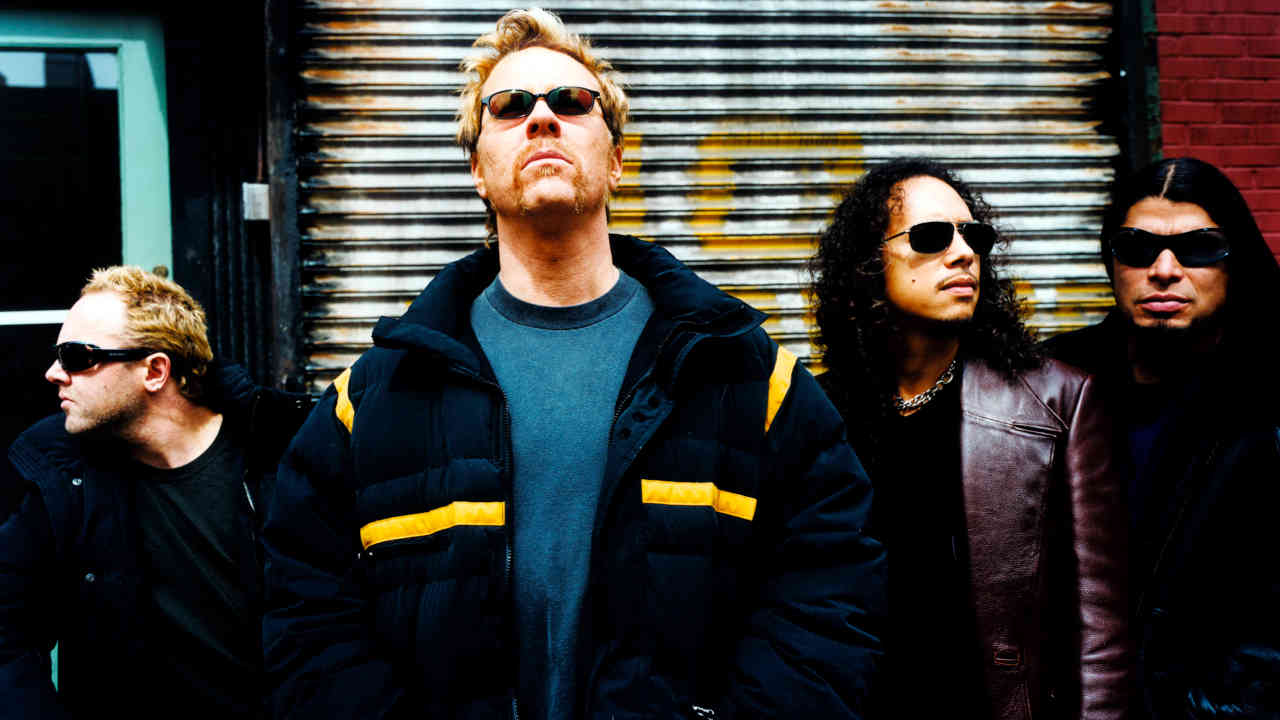
For much of the first 20 years of their career, Metallica seemed indestructible, with their self-titled 1991 album – aka the Black album – turning them into the biggest metal band on the planet. But by the time of 2003’s St Anger, the wheels had come off, with bassist Jason Newsted quitting, James Hetfield entering rehab and the band almost falling apart as they made the most divisive album of their career. As Metal Hammer joined Metallica in New York as they were putting the finishing touches to St Anger, we found a band who were ready to put their travails behind them and open a bold new chapter

There comes a point in every person's life where you have to take stock of who you are and what you’re about. When a band faces the same tough questions then generally it goes one of two ways: a) they seize the opportunity to adapt and change for the better, flushed with the confidence of new life or b) take the more distressing route, and they fail to take any chances at all, they desperately cling to past glories and inevitably fade away.
How any band arrives at such a decision has as many different routes as it does potential fuck ups. Maybe they've run out of that rich vein of ideas which saw them reach the top, maybe they lost an integral member who provided focus or direction or, even worse, maybe the passage of time has allowed for that little bit too much self-reflection resulting in a formulaic new album.
Metallica faced have all of these obstacles and many more besides since the release of their last studio record, '97's patchy Reload. However, on first listen to their ferocious new album, St Anger, it very much does sound as if the Metalli-clan are firmly back in the leather-clad saddle. St Anger will defeat even the most cynical of metal heads who claim to have lost faith with the band over the many aural and visual 'experiments' which accompanied the Load sessions.
Thankfully, there is no sign of the dreaded 'coffee table rock syndrome' perpetuated by the likes of latter day Chili Peppers, Nickelback et al and St Anger will never be the one metal album of the year your non-rock loving mates feel comfortable buying just to look cool. Indeed, in terms of the Metallica canon St Anger's only cousin has to be '88's monstrous …And Justice For All, and that is purely based on song length and arrangements. St Anger is pure heavy metal. It’s Metallica at their most visceral, with a vicious, almost punk-metal-ish sneer of foaming attitude.
It’s an amazing feat that Metallica care enough to make such a confrontational sound as this - a fact made all the more incredible when you consider that this is, after all, the band whose Black album alone has sold a staggering 26 million copies (and counting). Sounding as it does, St Anger will sell nowhere near that multi-million mark and will probably even struggle to match the six million achieved by Load.
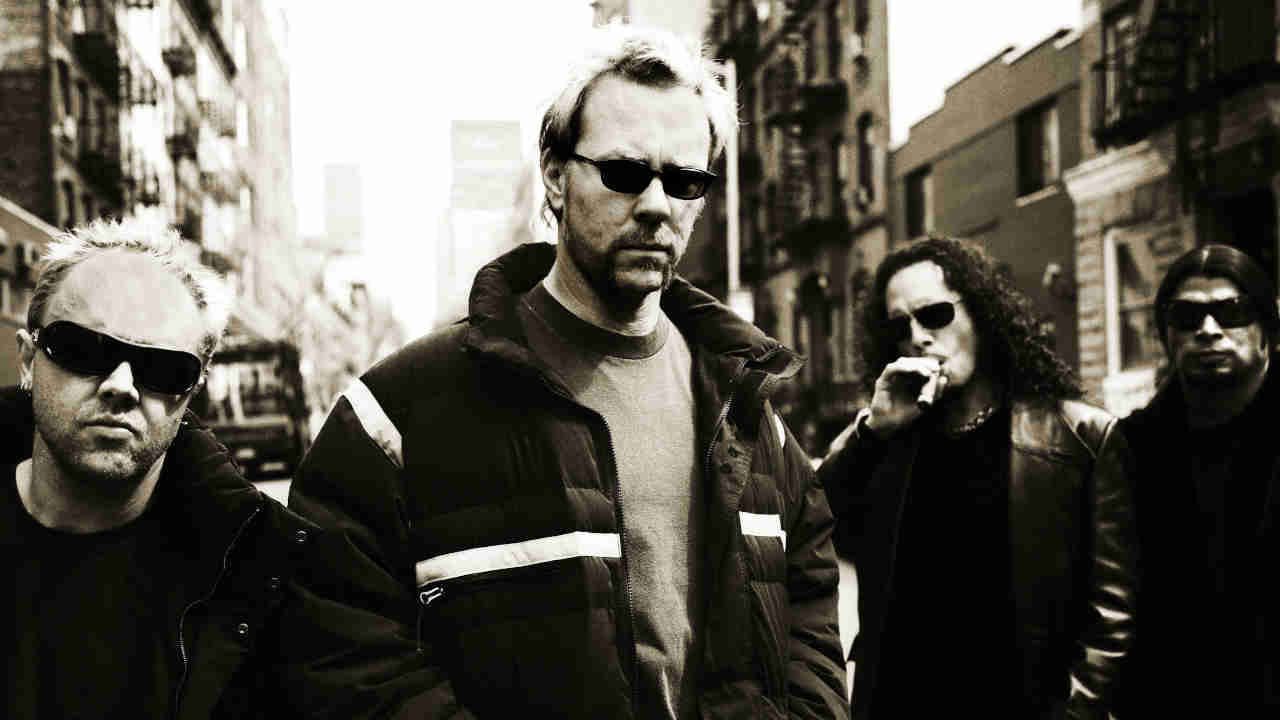
When Hammer caught up with Metallica on the final days of mastering in New York in mid-April, the band hadn't even decided which tracks would be a singles (despite being booked to make a video in less than three weeks’ time). Surreally snuggled into the 'cosy' confines of a mastering studio between Annie Lennox and Destiny's Child, Metallica Mk Ill – James Hetfield, Lars Ulrich, Kirk Hammett and new bassist Rob Trujillo - are being stalked by an Osbournes style camera crew who're documenting each second of their lives for a future cinema release.
As you might expect, Metallica are revved up and rarin' to go after a full two year lay off that has seen both a bitter split with long time bassist Jason Newsted and, rather more shockingly, the news that for nearly six months of that time Singer/songwriter/guitarist/frontman James Hetfield had, for all anyone else in the band knew, quit music altogether.
James entered rehab voluntarily in early summer of 2001 after waking up and realising that a bottle of Stolichnaya vodka for breakfast was not what the band nutritionist had in mind when he recommended a liquid start to the day. Away from band life, James confronted many of his personal demons, realising that the drinking was but a symptom of a much larger problem. The real issues lay deep inside the singer's head, embedded within in his own value systems and childhood. Without James first dealing with those issues he was never likely to ever set foot on stage with Metallica again.
For their part, Lars and Kirk (after the initial panic), knuckled down to keep Metallica going, bonding with producer Bob Rock who became the band's unofficial fourth member for the duration. After running a full gamut of emotions the Metalli-crew were reunited at Kirk’s birthday party in late 2001, and slowly, the band re-connected and started working on new material. Now some 18 months later, the fruit of those sessions is ready to go, and St Anger is its name.
Each of the four members of the band are ready to give their version of events of the past few years, and of the making of St Anger itself. First up is James Hetfield himself
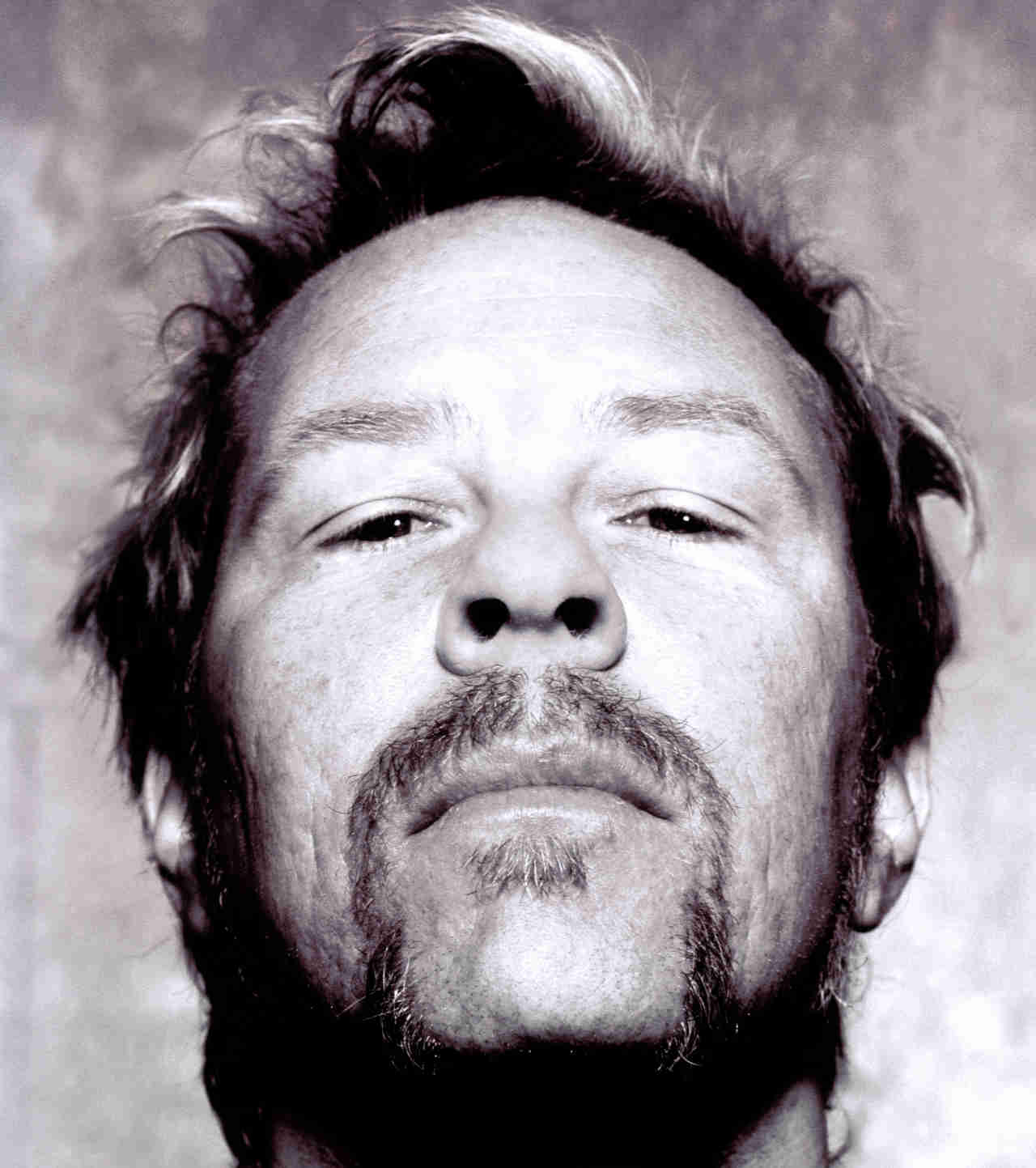
With St Anger you sound as if you've deliberately turned back the clock, and gone 'old school' with some added contemporary tricks. In fact, the nearest any comparison you can make is ... And Justice For All. Did you deliberately set out to go retro?
James: “It became deliberately more old school after we started feeling good about playing again and after we discovered that we feel good about playing aggressive again. The aggression came about when Lars would end a take jokingly, with a burst of double bass and we’d all pitch in, playing along for a laugh. Once we got over that initial hump of taking the piss of ourselves we were like, ‘Hey, that sounds real good’, and then it started feeling real in a fresh new way.
“With more new production tricks and with some deep, intense lyrics it all started to come together. When we got up to 15 songs or so we took stock and I realised that we had written all the right tunes but where were the riffs? It would be perfectly good, but there would be only one riff per song! That’s when we realised we could put all the multiple riffs per song back in. Now as soon as one riff is done we'll come and get you with an even bigger, crushing one, heh, heh.”
Were you surprised at how pissed off sounding the record ended up becoming?
James: “I have to say that the more we feel as brothers again these days then, yeah, the more this angry stuff seeps out in the form of this Metallica vs the world thing, if you like. On Kill ’Em All, there's no doubt we had it – we were friends and brothers in arms out there battling against 80s big hair bands. It feels really good to be strong again.”
St Anger is as empowering an album title as it can get –there’s a whole load of piss and vinegar left in Metallica,
James: “My thing is that I get annoyed that people won’t let you. I think anger has bad rap. It has these connotations that something bad is gonna happen or something is gonna break, but for me anger is a good way of getting your point across a lot of times - in a healthy way without degrading or injuring another person. It’s definitely an energy we all feed off.
“Growing up in my household there was no anger allowed but I sure as hell felt it, like everyone else did. I would feel it all the time and I'd swallow it and swallow it and bottle it all up and pretty soon instead of my anger being directed it kinda came out sideways, seeping out unexpectedly."
Where does the title St Anger come from?
James: “I remember someone giving me a St Christopher way back in the Ride The Lightning days and it took me years more to discover that he was the patron saint for the protection of travellers. When I came out of rehab it really hit home to me that we didn't have a patron saint of anger. And if there wasn't one then, dammit, Metallica were gonna create one.
“So if you’re looking for the genesis of the St Anger idea then l guess it lies with me going through rehab and doing some serious soul searching. I had various religions being thrown at me in there – in rehab there were a lot of recovering Catholics, heh, heh. The iconic dogma attached to it all must’ve impacted upon me.”
How long did you actually spend in rehab?
James: “The program was scheduled for seven weeks and I ended up staying for another two because I was such a good subject! There were still some grieving issues had to face, particularly with my parents and then Cliff [Burton, Metallica's original bassist, who died in 1986] and it was great I stayed there for a few weeks and then I went looking for some more at different places, again solely to keep that perspective flowing.”
Most people reading this won't have ever been anywhere near a rehab centre. Can you explain what new perspectives your time spent in there gave you?
James: “I've said recently that rehab was college for my head, but really I meant to say that it was college for my soul. I had no idea how to get to a point of belonging that I perceived everyone else had. I know it sounds weird – here’s James from Metallica, he's a guy who has everything – but still, it never clicked in my mind what it was that I was working toward. What was my purpose? What was my role in this life? Nothing made sense to me. Stripping all that away then you start to really understand that, ‘Hey I'm in here in rehab for me, not my family, not my band, but for me and my mental health and its important.’ Before that I had a real fear that I might be insane with all those fears and questions floating around, but of course, if you’re sane enough to rationalise that you might be insane then usually you’re not.
“Anyway, there was a lot of stripping away of the things that I had traditionally believed I was. I never thought I was the guy walking around being ‘James of Metallica’. If you’re saying ‘Hey, sit down and have a beer’, with a couple of fans and talk to them on an even level then I had no problem, I could do that, so it went a lot deeper. knew that there was still a part of me searching for acceptance. There's a lot of stuff from childhood that feeds into this, some things I picked up just like everyone else does and yet there were a lot of other important bits that I just didn’t get taught. In rehab I could ask stupid questions about life and people would give me their take, which as good as it can get.”
Did you find your answers?
James: “I discovered the differences between a lot of things that I had always considered to be the same, so I think l appreciate life much more now. I've found out what love and passion really is, I've discovered the differences between sadness and depression too. Now I really understand how much my family and my band means to me and how they need to be together in my life instead of separated. I was compartmentalising my life: band 'here', family over 'there' and never the twain shall meet All my energy was being wasted on trying to control and separate these two huge entities.
“Giving up trying to control everything huge part of my education in rehab. My mission was to let every all that go and let the two come together as one powerful entity that I could be part of.”
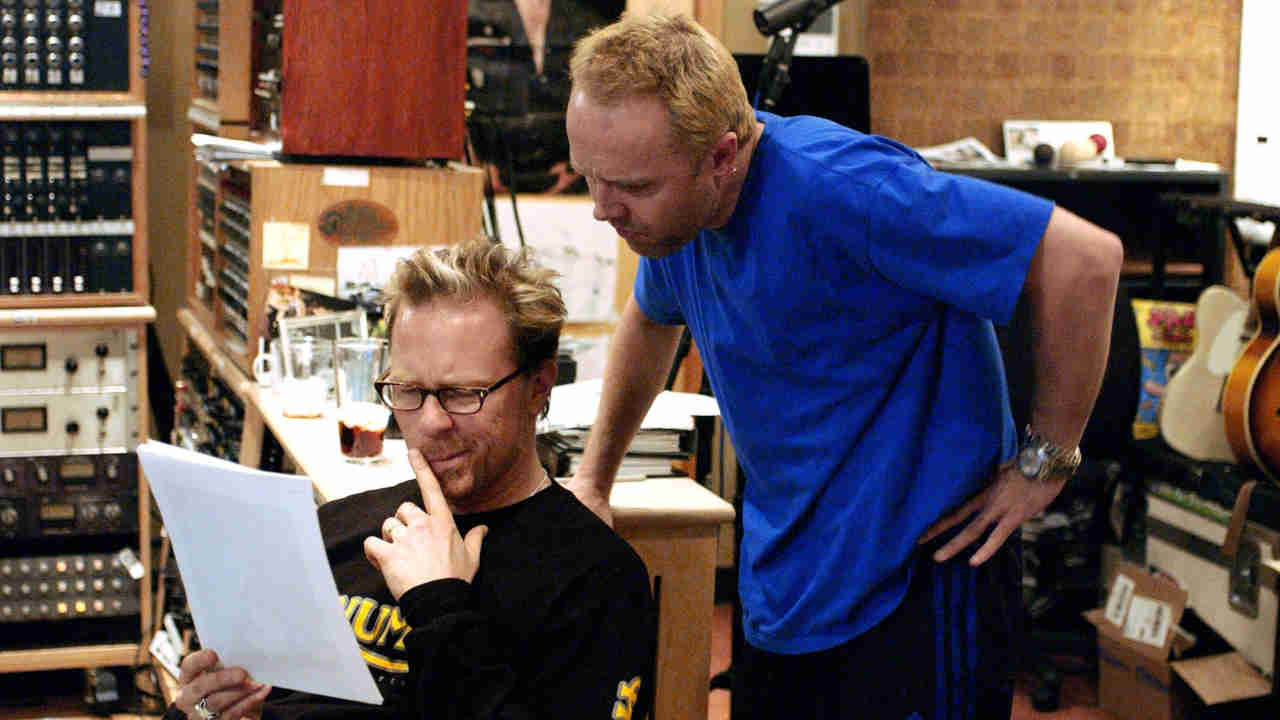
St Anger features lyrical contributions from all of you. Would the old James Hetfield have been comfortable with everyone pitching in to write or improve lyrics on one of his songs?
James: “Most definitely not. We were all very territorial about Our gig in Metallica, especially me. The way l looked at it was if someone else wrote the words then what the hell was I here for? It was Bob Rock who started off this change by attempting to address some of my previous stresses I'd had on Load – ‘now off you go to your cave and don't come back until you've crafted 20-odd sets of lyrics’. I mean where do you start? Here's 20 plates and you have to fill each one with a different tasting meal or come from a different angle. It was so, so difficult. And l’d emerge from my secret cave of emotional hell with my lyrics carved on sacred tablets only to have Bob or Lars smash ’em and say, ‘no good, back to the cave you go, 'cos we know you can do better.’ Yeah, right guys.
“So Bob got us past that point quickly by telling everyone to think about what we wanted to say. He put me on the spot by handing me a microphone and asking me to come up with a melody that I liked in the first week. Right then and there, that was a breaking point for me. That was huge, cos I was left thinking, ‘Uh, what if I can't come up with something right here and now?’ It was a huge fear of mine to fail in front of the other guys. So there I was asking for help, what a turnaround."
Lars has given the impression that while you were away he very much feared for the future of Metallica. Did you ever feel that way or were you always sure that Metallica would somehow endure?
James: "Metallica has been through a lot of problems – through Cliff dying, me breaking my arm twice, me getting all burnt up after I stepped on the pyro [in '92] and each time l knew that Metallica would go on. This time, I had to get to the mindset of ‘Hey, can I just imagine that I’m not in Metallica right now and I’m just taking care of myself?’
“I knew that if I couldn’t get over that and if I couldn’t understand the concept of not being able to imagine not being in Metallica - and remember I've worn that badge since I was 18 years old - then I couldn’t come back and be healthy within Metallica. It was about dealing with that realisation that I'd always been relying on the band to reassure me and provide me with my personality. I had to separate from family and band and all that entails to realise that if Metallica didn't continue then l'd still live and the world wouldn’t die, y’know? But, no shit, it was a truly very scary time for me.
“I knew that all the other guys were going through a very rough time dealing with it. Lars always wants to feel control over everything. just like I do, so it was particularly rough on him. The months and months of the guys going round in circles waiting for me when l didn't even know whether I was gonna be back must’ve been very hard. In the end they came to the same conclusions as me - just let it go, stop trying to control a situation that you can't and just see where it takes you. I think it was healthy for each one of us to have been through that."
What led you to pick Rob as the new guy?
James: “That’s real interesting, ’cos Rob wasn't on my initial list. Trying not to be attached to the outcome of that decision was very, very tough. I had my buddy Pepper [Keenan, Corrosion of Conformity/Down guitarist] who grew up the same way as we had, who knew our struggles, who had his own ideas and was as driven as we were, but when it came down to the bass playing side, it just wasn't as good as Rob’s. As a guitarist playing bass you can play as much as you think you can handle but in the end you'll still have a guitarist's approach. Rob is a professional bass player and man, he pounds the shit out of that bass, he has it mastered. And personality wise, Rob fitted right in too, which is hugely important for a band like us.
“We don’t have preferences when looking for a new member, we have needs and we’re in such a position where we have to respect those needs. Metallica needs someone whose personality fits in, who is stable, who has no addiction issues, who can play the bass like a monster, who can handle the road, who can handle all the interviews, and all of these things matter. All the guys who made our short list had most of those qualities but Rob had all of ’em, and I cannot wait until we play live with the guy.”
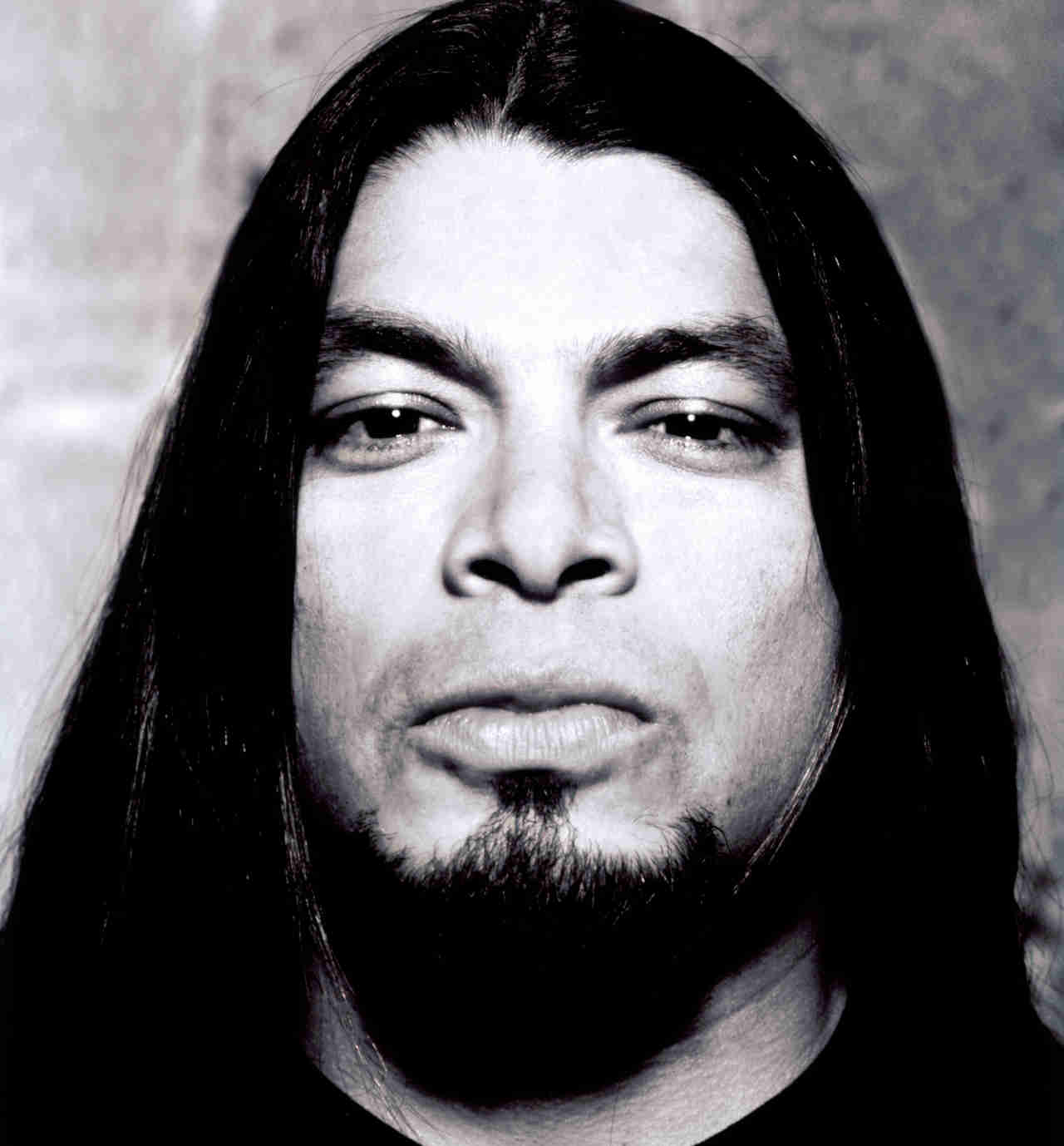
Rob Trujillo seems comfortable with the role of Metallica’s newest member, a previously filled by his predecessor, Jason Newsted (aka Newkid). He’s is laid back and relaxed – if the former Suicidal Tendencies and Ozzy Osbourne four-stringer is feeling pressures at joining the biggest metal band in the world, he’s not letting it show.
You must feel like the luckiest bastard on the planet landing this gig.
Rob Trujillo: “Hal Too true. I honestly feel like I've been on a whirlwind, what with coming from Ozzy's band, doing the Jerry Cantrell album [2002’s Degradation Trip] and now straight into this. But, all that change and activity really prepared me for being able to do this job right now. I had to learn and arrange bass parts for 30 songs in two weeks when I was working with Jerry and that set me in good stead when it came to learning all the new Metallica material in quick time.”
Are you comfortable with the fact that its Bob Rock’s bass lines on the album and that you’re gonna have to wait a few more years to make your recording debut?
Rob: “Oh that doesn’t bother me at all. The way I look at it Metallica were on a journey that they had to get through, what with Jason going and James’ stuff, and Bob was there every step of that way. The guys knew Bob and they were real comfortable with him and he did a great job playing bass on the album too, so they had to finish this journey with him before looking for anyone else.”
Do you feel like an equal member of Metallica? Do you have a full say in what goes on?
Rob: “It’s still early days and I haven’ even played a gig yet, so maybe in a fav months I will But, y’know, even now my opinions are expected. We each took home a copy of the album after the first day’s mastering and we each have to bring in our notes as to what we think. In fact, It’s kinda weird for me to be asked to make decisions having spent the last eight years playing with Ozzy 'cause obviously that's his band. The last time I was asked to make the type of decisions I’m making now was when I was in Suicidal Tendencies or Infectious Grooves back in the early 90s.”
How did Metallica break it to you that you had the gig?
Rob: “As they always do, they managed to catch me off guard. I'd had a second audition in February where we'd jammed on a lot more material and I felt really good about it but in these situations you never can tell. Anyway, I got a call in a, ‘Hey can you come up but we gotta talk to you in person' sort of fashion. I tend to look for the downside of things too and I was preparing myself for a conversation along the lines of, 'Well, Robert you’re a really cool guy but we wanted to tell you face to face that it hasn't gone your way.’
“So anyway there I was walking in the room at HQ and there they stood applauding with the management, the techs, the film crew and even the guys who run the fan club!"
How did you tell Ozzy you were leaving?
Rob: “It’s funny because when I went for the first audition back in November ’02, I didn't hear from them until the first week of February. At the same time I hadn't heard from Ozzy until exactly the same week! When it rains it pours, and within days I'd heard from Ozzy first and he'd committed to doing the Ozzfest this summer and then Metallica rang asking me to go back up to San Francisco and see them again. After I'd absorbed the Metallica thing the very first thing I did was to gather my thoughts and call Sharon [Osbourne] and explain what had happened and how I felt.
“Both Sharon and Ozzy were totally cool about it. In fact, Ozzy called me a couple of days later to congratulate me he was like, ‘Good on yer fella, they're a fuckin’ amazing band!’”
Were you surprised to hear that Jason Newsted had joined Ozzy's band after your departure?
Rob: “No, I wasn't really. In fact, if I’m honest. once l knew Voivod were on the Ozzfest bill I kinda wondered if Jason would do it because it just made so much sense Jason is an amazing bass player and he loves all that Sabbath stuff.”

Kirk Hammett isn’t an original Metallica member – he was poached from Exodus to replace ex-guitarist Dave Mustaine in 1983, after the latter was fired literally days before they recorded debut album Kill ’Em All – but he’s been an invaluable part of the machine ever since. And after the departure of Jason and James’s lengthy hiatus, it looked for a minute like he would be just one of two members left, something he can joke about now but didn’t seem funny at the time.
St Anger is a very different sounding record to anything else Metallica have done. The only comparison has to be ... And Justice For All. What's your take on that comparison?
Kirk Hammett: “I agree St Anger is such a different sounding record to anything that Metallica have ever done, so for the sake of having to describe it, I can understand some of the …Justice comparisons too. But for us it's not a case of going retro or looking back. To me St Anger references some of those past moments but it's in a completely new environment. It brings me back to those classic days mainly because It’s so fast. It felt good to do that back then and it feels good to do it that now. There was a time when playing fast and aggressive was old hat to Metallica - most of the 90s to be honest - but once again it now feels comfortable for us to do that. Our hearts are really into it.
St Anger is almost a punk-metal album in places, wouldn't you say?
Kirk: “It's anti-nu metal, anti-pop, anti-everything record. People tell me it has punk elements but that freaks me a bit. Punk these days seems to be about marketing tool, a look, an image, whereas to me punk is very very old school, very anti-establishment do-it-yourself attitude.
"Real punk is about anti-glorification, anti-publicity and being anti-corporate, but that said, I do hear that Misfits/GBH/Discharge style high energy and a ‘fuck the world’ attitude. I used to worship bands like that. But, to me, this is metal in '03. We've raised the stakes that bit where everyone else has to follow.”
So is the fire is back in Metallica now?
Kirk: “I don't think it ever went out. It just changed colour, it's turned up brighter again. Why has it happened? I can't pinpoint the exact reason. Maybe it's where we're at socially or culturally, or where we're at as people in our lives and needing that release. All that makes for a great answer but the truth is we've arrived at this point very organically.”
“Y’know we went into a room and started jamming and this is what you get. Hand on heart there are recorded parts on St Anger that are the very first moments of us ever playing them – because everything was recorded digitally for the first time, we could do that. We would capture those spontaneous moments, I think that has to be one of the main reasons the record sounds so fresh. We didn't re-record or do a million takes or rehearse the fuck out of them. There are many moments on St Anger where you can hear the actual genesis of the song, which has to be super special – before that recorded moment that music didn't exist. It’s that fresh.
“Put it this way - we feel as much passion for what we do today as we did back in '83 and if you ask me we're a stronger band today. Right now I see Metallica as a brand new band. Rob injects so much more coolness to this band. Where was he in ’86 is all I'm gonna say? No diss to Jason obviously, ha!”
Was it a surprise when Jason quit?
Kirk: “It wasn't that great a surprise, no, but it still hurt. We had just done the VH-1 music awards playing Fade To Black and the atmosphere was real bad and we agreed we'd have a sit down band meeting. Now, everyone goes to the band meetings, period. No excuses you’re there. Jason didn't walk out, he didn't even show up! The message l got was that he didn't care and he didn't wanna be involved anymore.
“He called the next meeting and we even brought an outsider - a mediator along [band therapist Phil Towle]. When he dropped the news the first thing I said was, ‘Jason you have no right to make a decision to do this without consulting the rest of us and on top of that you’re impacting on everyone else's life!’ I begged him not to leave. I said ‘C’mon we can work this out so let's do just that’, but the dedication wasn't there. He didn't wanna do it.
"Y'know for years and years Jason would preach about how dedicated to the Metallica cause he was. He'd really shove it in our faces about how he was the one out after a gig signing stuff while we were all to busy doing our own thing and, fair enough, he was, but all that went out the window. I don't know how or when he made up his mind but he did.
"I was a mess, I was bawling and crying, begging him not leave. And short of getting down on my hands and knees and begging him that way l couldn’t see what else to do [but let him go]. We also knew the way that he left the band that one day he’d regret it and even though I don't wanna get into a slanging match, it’s pretty obvious to me reading some of the things that he's said about us in the press recently that he has serious regrets about going.”
James was saying that he felt for you and Lars when he went away because he understood that with Jason and him gone Metallica really was just down to you and Lars.
Kirk: "It was difficult. It was very scary indeed. Lars and I would joke ‘…and then there were two!’ We would laugh, ‘Out of all of us who would leave? Oh look, the so-called most dedicated one! Then out of all of us, who would end up in rehab? 0h look, it's the guy who doesn’t have a bad rep, unlike Kirk and Lars!’ It was so fucking bizarre.
"Lars and I felt it was crucially important for the pair of us to keep meeting and working out ideas. It was so strange man, especially when it became clear that there was a very real chance that James wouldn’t be coming back. No one had spoken to him and, worse still, there was no line of communication to him either. We knew that he needed time to re-acclimatise to society, for want of a better term, but we didn't realise it would take months and months. And all that time we spent waiting was fucking horrible! We didn’t know how he was feeling or what he was thinking.
"After three or four months of hearing about James shopping in malls or distant friends seeing him out and about it came to a head many months later when my wife threw a surprise birthday party for me. We’d been out and had a quiet meal and afterwards she suggested we headed to this bar we knew. When I walked in - surprise - there were about a hundred or so people in there, including this one tall, blond haired guy, like, ‘Holy shit - its James!’ I could see in his eyes that he had a clarity and awareness that I had never seen before. That was the best birthday present I've ever had.
“Having completed the journey l’d like to think that St Anger is a total celebration of the fact that we can get our heads down and make some incredible music. What you hear is an unbridled flow of creativity.”
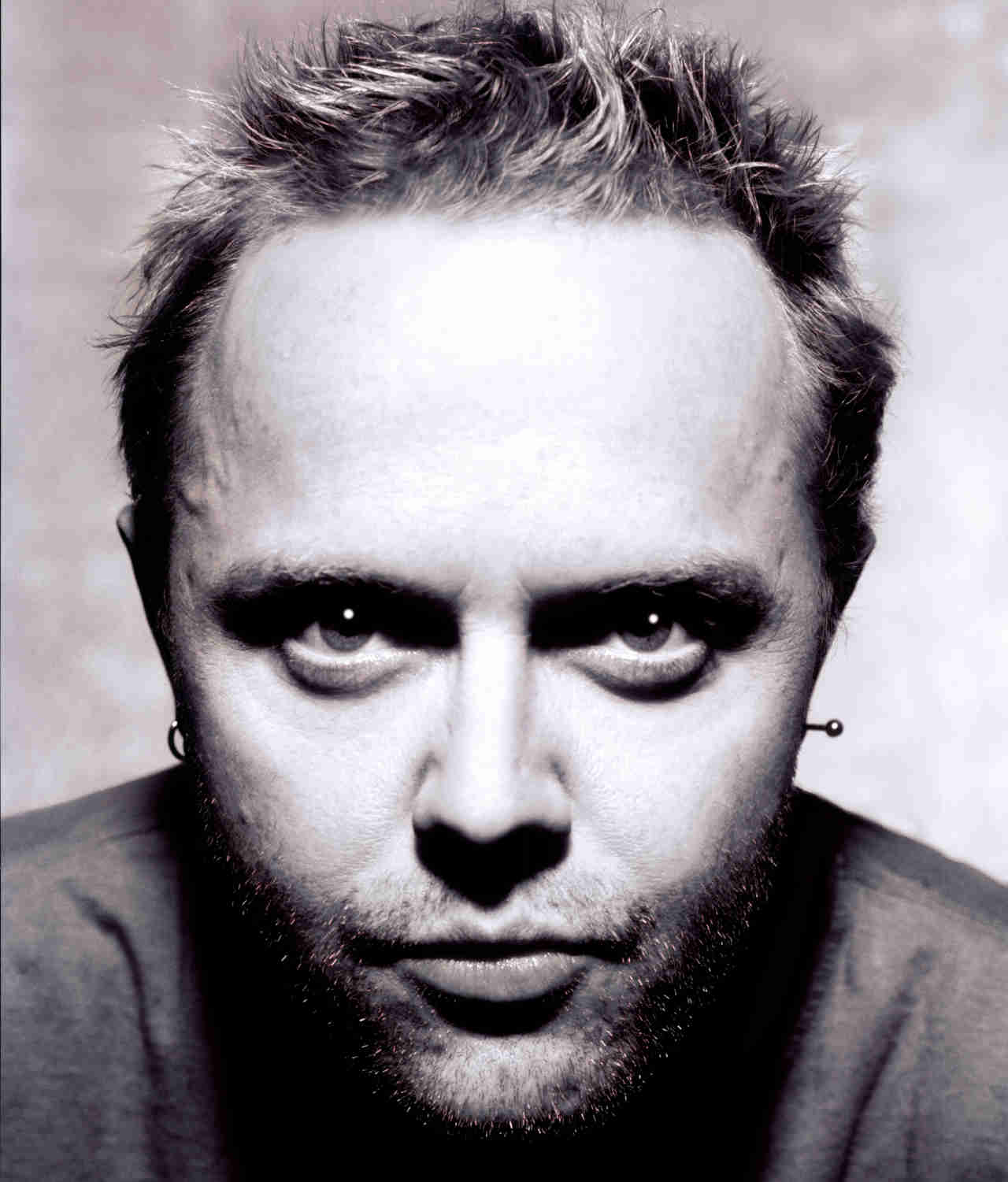
Lars Ulrich is already heading of countless questions he knows he’ll have to face in the coming weeks and months. “What’s St Anger mean to you, Lars? Are you calling it that so you can prove that you still have it? Are you saying that you're ready to wear the crown of metal again? I've heard all the questions by now.” It sounds less like the drummer is being defensive, more like he’s laying down a challenge for anyone attempting to psycho-analyse his band and the period of turbulence they’ve been through.
Ok, then Lars, start at the beginning. St Anger - do you like what you've come up with after six years?
Lars Ulrich: “Today it's my favourite and hopefully it will be tomorrow too. It feels right to have made a record like that but hey, if we sat here during the mastering of any Metallica record, I’d hope that my pride would kick in to say exactly the same thing every time. Don’t ask me for perspective at this point because I don't really have it. That said, I am aware enough to realise that something very different is going on with this record. I sent a copy to a friend of mine in Denmark and he rang me back saying, ‘This isn’t the band that did the symphony record!’ Well hey, no fucking shit, this is heavy metal!
“It feels comfortable and effortless to play fast again. St Anger is a very organic record and it’s a very pure record that makes me fucking proud.”
St Anger sounds like a throwback kind of a record to these ears, especially in terms of the length and proggy arrangements which 'classic' Metallica used to trade on, but its also infused with that punk spirit of Kill ’Em All…
Lars: “When we stop trying to consciously write short songs then this is what Metallica will come up with. For a while our records in the 90s were a reaction against our earlier long songs and now we've gone full circle reacting against those shorter ones.
“We’ve spent a year working on this project and we still have a bucketload of songs that haven’t made the record and the one thing that unifies all of that material is spontaneity. We had a golden rule that no material would be written off premises. James and I didn’t go off to a basement and write all the arrangements together away from Kirk or Bob, Kirk didn't work on any riffs or solos away from the studio, James didn't work on any lyrics or riffs away from the rest of us as usual. We went forward with the idea that the record had to made in that one room.
"Prior to this record a studio was a place where we would go to execute and deliver a pre-arranged plan. Everything was written away and then we would turn up and record it. That made the studio a place of work not a place of creativity."
Is St Anger the sound of you deliberately ejecting 'the mainstream sound'?
Lars: “Ah, I dunno. What is the mainstream these days? System Of A Down have sold nearly four million copies of their last album, but you can hardly call them a mainstream acts can you? l guess l'm just not so into the metal scene anymore. I listen to the radio and hearing System or Godsmack on s0-called ‘mainstream’ radio spins me out.
"I think given the ups and downs that this band has been through in the last few years - the way we closed the 90s as the 'bad quys’ because we took a stand against Napster, with Jason going and with James’ departure, then I think that this was the first time where we felt we could just throw caution to the wind and see how the pieces fell because we had little to lose. We felt so isolated from anyone else. Those two years away were the best thing that ever happened to us. I'm glad we got off that conveyor belt of four records out each Thanksgiving in four years, I'm just glad that there is even a Metallica, I'm glad we got over Jason leaving, I'm glad that James Hetfield is still alive today, y’know, all the big stuff"
Does this feel like a new chapter? Metallica Mk. III?
Lars: "I hate clichés, I really do, but there's no way around this, it really does feel like a new beginning for Metallica. The energy that Rob brings to the party is incredible. With Jason around the energy was so much more intense but Rob is just so natural and unforced to be around. He has an almost Zen like quality to him that Metallica really needs. And no disrespect to previous bass players but Rob's work sits in a very different place, it feels more like a proper unit.
“With Jason maybe we got off to a really bad start because we picked on him so bad and in retrospect we never let him grow out of that place we’d created But you gotta remember we were replacing someone who had died, someone who was taken from us. Back then we weren't quipped to deal with that.
“I understand now that the way we did deal with Cliff’s death was to compartmentalise it. It was like we were saying to ourselves, ‘Let's park Cliffs death away in some far corner of our minds and we'll never talk about it among ourselves and well drink it away and we’ll get a new bass player and well work it all out on the road cos that's what we do and hopefully in the end we'll pretend it all away.’
“In retrospect we took Cliffs death out on Jason and he never really recovered from that. I think we never considered him an equal because of the circumstances of him joining. Rob, of course doesn't have any of those issues to contend with so It’s far easier for him.”

You still sound incredulous that Jason even left the band…
Lars: “I was at the time! It was like, ‘You’re doing WHAT? You can't leave Metallica. We haven't said that you can, we haven't told you what you can do' But Bob was there throughout all of it, from Jason leaving throughout James going away When James first came back in September 2001, the night before we were due to get back into the studio he called up management and said, ‘Hey l'm not ready and please don't phone me, I’Il be in touch whenever I'm ready to start again.’ Now that was a fucking surprise That wasn't so easy to deal with. We spent months looking at the phone waiting for it to ring.”
Are Kirk and James the same people they were 20 years ago?
Lars: “They are different people now but obviously they still retain some of the characteristics that make ’em who they are. The major change has to be the one undergone by James Hetfield in the last two years. He's fully addressed all the issues that were dogging him over his first 38 years. I mean, James still clears his throat in between words when he's nervous and he's still the same person, but his outlook is way more healthy now."
With Pushead's weathered artwork style back on the album cover St Anger seems like a complete rejection of that super styled Load-era Metallica. Would you agree?
Lars: “I know it seems like that but I can look you right in the eye and tell you that It’s not that contrived. In ’96, when we wrote the Load material, it was the best we could do and that whole cosmetic change that we went through was the right thing to do.
"You gotta understand that Load was a reaction against the Black album, which in turn was a reaction to …Justice. It’s well known that I have a fear of repetition so I understand the knee jerk reactions to each record. I do remember that as the Load album cycle continued I had more and more people coming up to me and saying that they never gave the album a chance because of how it was presented to them. That makes me wonder how Load would have gone across had we not done the hair thing, not done the make-up thing and had the album in Pushead artwork, y’know..
"I still feel like that now even though Load and Reload have turned into some sort of Metallica punching bag for the fans. The hair, the pictures, the blues riffs, the country influences it was all what we wanted to do ... so [laughs] fuck you!"
This feature originally appeared in Metal Hammer issue 114, May 2003







